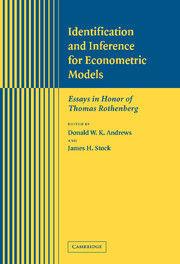Book contents
- Frontmatter
- Contents
- List of Contributors
- Preface
- Part I Identification and Efficient Estimation
- Part II Asymptotic Approximations
- Part III Inference Involving Potentially Nonstationary Time Series
- 15 Tests of the Null Hypothesis of Cointegration Based on Efficient Tests for a Unit MA Root
- 16 Robust Confidence Intervals for Autoregressive Coefficients Near One
- 17 A Unified Approach to Testing for Stationarity and Unit Roots
- 18 A New Look at Panel Testing of Stationarity and the PPP Hypothesis
- 19 Testing for Unit Roots in Panel Data: An Exploration Using Real and Simulated Data
- 20 Forecasting in the Presence of Structural Breaks and Policy Regime Shifts
- Part IV Nonparametric and Semiparametric Inference
15 - Tests of the Null Hypothesis of Cointegration Based on Efficient Tests for a Unit MA Root
Published online by Cambridge University Press: 24 February 2010
- Frontmatter
- Contents
- List of Contributors
- Preface
- Part I Identification and Efficient Estimation
- Part II Asymptotic Approximations
- Part III Inference Involving Potentially Nonstationary Time Series
- 15 Tests of the Null Hypothesis of Cointegration Based on Efficient Tests for a Unit MA Root
- 16 Robust Confidence Intervals for Autoregressive Coefficients Near One
- 17 A Unified Approach to Testing for Stationarity and Unit Roots
- 18 A New Look at Panel Testing of Stationarity and the PPP Hypothesis
- 19 Testing for Unit Roots in Panel Data: An Exploration Using Real and Simulated Data
- 20 Forecasting in the Presence of Structural Breaks and Policy Regime Shifts
- Part IV Nonparametric and Semiparametric Inference
Summary
ABSTRACT
A new family of tests of the null hypothesis of cointegration is proposed. Each member of this family is a plug-in version of a point optimal stationarity test. Appropriately selected tests dominate existing cointegration tests in terms of local asymptotic power.
INTRODUCTION
In recent years, several papers have studied the problem of testing the null hypothesis of cointegration against the alternative of no cointegration. Avariety of testing procedures have been proposed, but very little is known about the asymptotic power properties of these tests. In an attempt to shed some light on the issue of power, this chapter makes two contributions.
First, a new test of the null hypothesis of cointegration is introduced. Similar to the tests proposed by Park (1990), Shin (1994), Choi and Ahn (1995), and Xiao and Phillips (2002), the test developed in this chapter can be viewed as an extension of an existing test of the null hypothesis of stationarity. Unlike the tests introduced in the cited studies, the test proposed herein is based on a stationarity test (derived in Rothenberg (2000)), which is known to enjoy nearly optimal local asymptotic power properties.
Second, the paper compares the power of the new test to the power of previously proposed tests by numerical evaluation of the local asymptotic power functions. It turns out that a cointegration test based on an optimal stationarity test inherits the good (relative to competing test procedures) local asymptotic power properties of the stationarity tests upon which it is based. In particular, the new test dominates existing tests in terms of local asymptotic power. Section 2 motivates the testing procedure introduced in this paper.
- Type
- Chapter
- Information
- Identification and Inference for Econometric ModelsEssays in Honor of Thomas Rothenberg, pp. 357 - 374Publisher: Cambridge University PressPrint publication year: 2005
- 1
- Cited by

